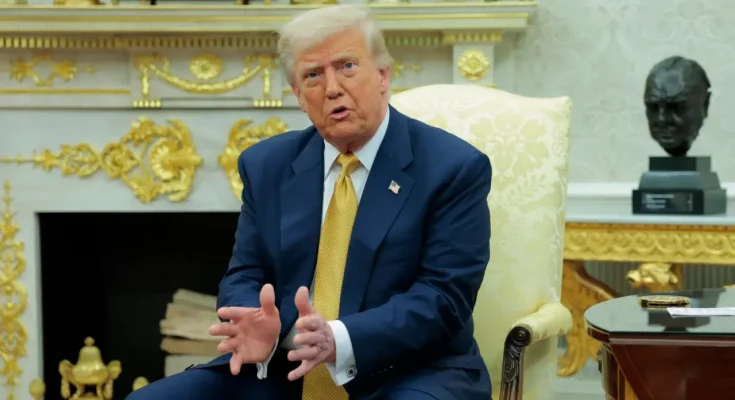WASHINGTON D.C. – In an extraordinary escalation of his ongoing battle with the media, President Donald Trump has filed a massive $20 billion libel and slander lawsuit against The Wall Street Journal, its corporate owners Dow Jones and News Corp, media mogul Rupert Murdoch, and two of the paper’s reporters.1 The suit comes in response to a recent Wall Street Journal report alleging that President Trump sent a sexually suggestive birthday letter, complete with a nude illustration, to convicted sex offender Jeffrey Epstein in 2003.2
The lawsuit, filed in a federal court in the Southern District of Florida, alleges that the Wall Street Journal’s story is “false, malicious, and defamatory,” causing “overwhelming financial and reputational harm” to the President.3 President Trump has vehemently denied writing the letter or creating the drawing, calling the document “fake news” and asserting, “These are not my words, not the way I talk.4 Also, I don’t draw pictures.”
According to The Wall Street Journal’s report, the letter in question was part of a leather-bound album compiled for Epstein’s 50th birthday.5 The newspaper claims to have reviewed a copy of the album, which allegedly included contributions from various high-profile individuals associated with Epstein.6 The page attributed to Trump reportedly featured typewritten text framed by an outline of a naked woman, with the President’s signature placed in a compromising location.7
The lawsuit argues that the Wall Street Journal failed to provide concrete proof of the letter’s authenticity, such as attaching the letter or drawing, or explaining how it was obtained.8 President Trump’s legal team contends that “the reason for those failures is because no authentic letter or drawing exists,” suggesting the story was concocted to malign his character.
This legal action is the latest in a series of high-stakes confrontations between President Trump and news organizations he perceives as hostile. The President has previously secured multimillion-dollar settlements from other media outlets. However, this case marks the first time he has initiated a defamation lawsuit as a sitting President, raising significant questions about freedom of the press and the use of the judicial system for political ends.
The Wall Street Journal has stood by its reporting. White House Press Secretary Karoline Leavitt, defending the President, stated that the WSJ “refused to show us the letter and conceded they don’t even have it in their possession when we asked them to verify the alleged document they’re basing their ENTIRE fake story on.”
The controversy has also reignited public debate around the Jeffrey Epstein case, with some of President Trump’s supporters calling for greater transparency regarding Epstein-related files.9 In a related development, the Department of Justice has asked a federal court to unseal grand jury transcripts from Epstein’s sex trafficking case, a move some observers see as an attempt to address concerns within the President’s base.
As this monumental legal battle unfolds, it is expected to shine a harsh spotlight on journalistic standards, the intricacies of defamation law, and the escalating tensions between political power and the media. The outcome of this $20 billion lawsuit could set a significant precedent for the future of reporting on public figures.



